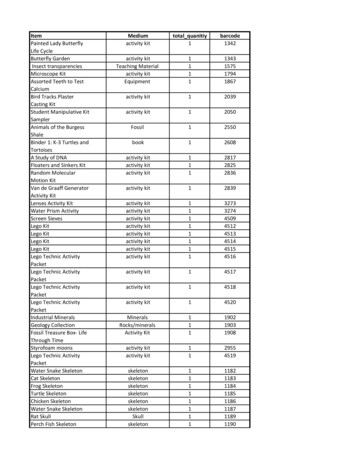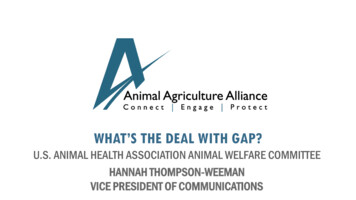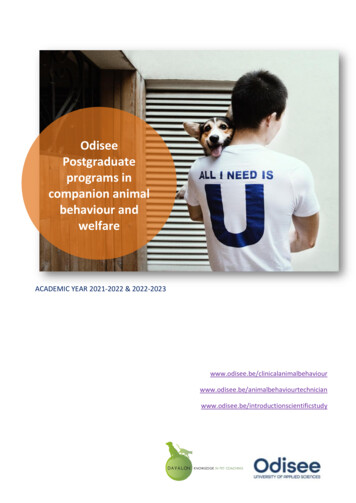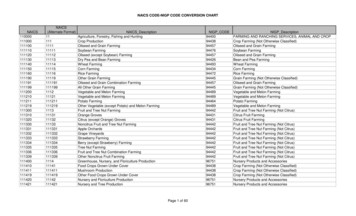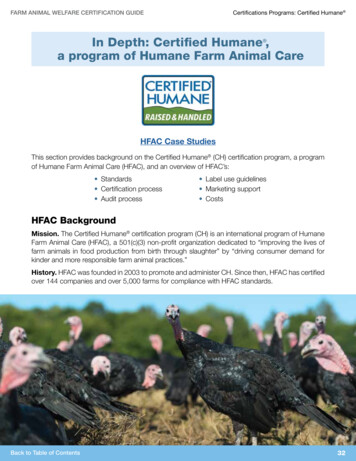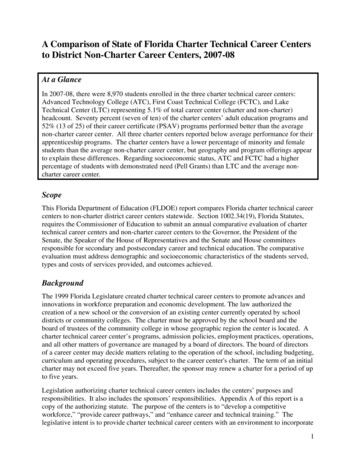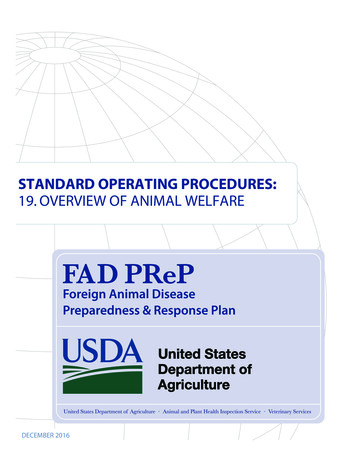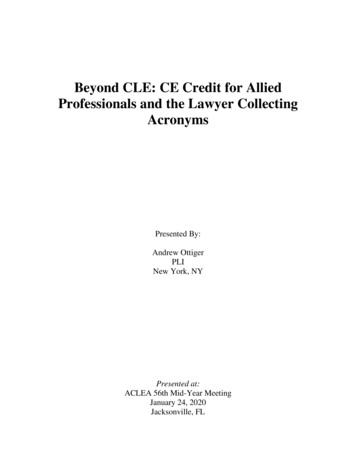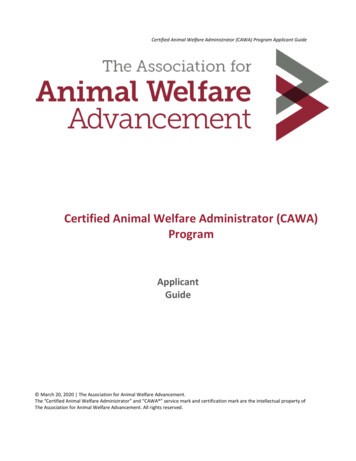
Transcription
Certified Animal Welfare Administrator (CAWA) Program Applicant GuideCertified Animal Welfare Administrator (CAWA)ProgramApplicantGuide March 20, 2020 The Association for Animal Welfare Advancement.The “Certified Animal Welfare Administrator” and “CAWA ” service mark and certification mark are the intellectual property ofThe Association for Animal Welfare Advancement. All rights reserved.
Certified Animal Welfare Administrator (CAWA) Program Applicant GuideTABLE OF CONTENTSContentsCertification Mission Statement . 3Geographic Scope and Language of the CAWA Program . 3Eligibility Requirements . 3The CAWA Exam Process . 4CAWA Certification Exam Fees . 4Applying for Certification . 4Scheduling Your Exam. .5Cancellation Policy . 5Special Accomodations .5Exam Results including Retesting . 6Preparing for the CAWA Certification Exam . 7Recertification Requirements . 8Quality Control . 10Failure to Recertify . 10CAWA Recertification Fees (every three years) . 10Unethical/Irregular Behavior . 11Revalidation of CAWA Exam Content . 12Grievances, Policy Interpretation Reviews, and Appeals . 12Data Confidentiality and Release of Certification Information to Third Parties . 12Beta Exam 2020 .12Addendums:EXAM SPECIFICATIONS / TOPICAL BLUEPRINT 13AUTHORITATIVE REFERENCES 17REQUEST FOR SPECIAL ACCOMMODATIONS . .18CAWA DOCUMENTATION OF DISABILITY-RELATED NEEDS 192The Association for Animal Welfare Advancement 3/20/2020
Certified Animal Welfare Administrator (CAWA) Program Applicant GuideCertification Mission StatementThe Association for Animal Welfare Advancement (The Association) Certified Animal Welfare Administrator(CAWA) certification program is designed to: independently validate and recognize the knowledge, skills, andachievements of high-level managers working in animal sheltering and field services; support best practiceswithin the profession; and broaden the understanding among those making hiring decisions and the generalpublic of the specialized qualifications required to successfully lead non-profit organizations and governmentalagencies dedicated to animal care.Geographic Scope and Language of the CAWA ProgramThe CAWA Program’s geographic scope is North America. Applicants may practice anywhere, but theprogram’s focus, standards, and exam content reflect North American standards of practice. Since the CAWAProgram’s geographic scope is North America, the CAWA exam and supporting materials are offered inEnglish. The CAWA exam is accessible from anywhere via computer-based testing.Eligibility RequirementsEligibility requirements must be met, without exception in any circumstances. To be eligible to take the CAWAexam, applicants must satisfy all the following requirements by the date of application:1. Possess a minimum of 5 years’ work experience which must have been acquired within 10 years priorto the date of CAWA Program application, as a high-level manager of a not-for-profit or governmentorganization. At least 3 years of work experience must have been acquired at an organization thatprovides sheltering and/or field services.a. A “high-level manager” is either a CEO or other paid staff who are within the following degreesof separation from the CEO:i. 2 Degrees, in organizations with fewer than 250 full-time equivalents (FTEs);ii. 3 Degrees, in organizations with 251-500 FTEs; andiii. 4 Degrees, in organizations with 501 or more FTEs.2. Possess a minimum of 5 years of work experience managing paid staff in any field.Work experience satisfying requirements 1 and 2 can be concurrent.Educational experience may not be used to substitute any of the work experience eligibility requirements.3. Agree to abide by The Association Code of Ethics.There is no requirement of an academic degree or continuing education activity for initial certification eligibility.3The Association for Animal Welfare Advancement 3/20/2020
Certified Animal Welfare Administrator (CAWA) Program Applicant GuideThe CAWA Exam ProcessThe exam is offered as a secure, remote proctored online exam starting in March 2020 with a beta exam.Membership in The Association is not required to pursue certification; however, members receive a significantdiscount on exam fees and recertification fees.Within approximately fourteen (14) business days of receipt of your completed application, The Association willreview eligibility qualifications, verify your employment history, and notify you by email of your eligibilitydetermination. Eligibility to take the CAWA exam shall be valid for one year from the date of the eligibilitynotice, unless otherwise specified by The Association staff.Eligible candidates will be provided with logistical details related to paying for the exam and scheduling an onlineproctored testing appointment. Applicants who are deemed ineligible may appeal that determination to theAppeals Committee of The Association Certification Council by emailing certification@theaawa.org.Questions about the application process may be directed to certification@theaawa.org.CAWA Certification Exam FeesCurrent exam fees (including beta exam fees and retesting fees) are published on The Association LearningCenter website, https://learning.theaawa.org/become-cawa. [Learn more about the beta exam on Page 12 ofthis document.]To take advantage of the Member rate, applicants must be a full Member of The Association in good standingwhen the application is submitted; the difference between the Member and non-member rate will not berefunded if a membership is subsequently purchased by an applicant who was a non-member at the time ofcompletion of the application. For more information regarding membership in The Association, please visit TheAssociation Membership page.Applying for CertificationTo apply, please go to https://theaawa.learningbuilder.com, then click the Register as an Applicant button.After you activate your account, fill out a short form with more information about yourself. Then click theorange Apply for Certification button. Scroll down to Employment Experience where you will submit yourrelevant experience(s). Then click on the Reference Contact button to submit contact information for yourreferences (one per employment experience). We require a supervisory/board reference. Your references willbe automatically emailed a request to confirm your experience. Once all of your references have beensubmitted and your eligibility has been verified, you will be approved for testing by The Association certificationstaff—you will receive an email verifying your eligibility with instructions on how to proceed.4The Association for Animal Welfare Advancement 3/20/2020
Scheduling Your ExamCertified Animal Welfare Administrator (CAWA) Program Applicant GuideAll exams are to be scheduled via a secure computer-based, proctored testing service called Examity which willbe available 24/7. You will be able to schedule yourself. If a candidate is a no-show for a scheduled examappointment or tries to change an appointment within 24 hours of the scheduled appointment, the test-takerwill pay a 5 proctor fee to Examity when they reschedule.Cancellation PolicyThe CAWA Certification Exam Fee is not refundable under any circumstances. Once you schedule an exam time,you may change the appointment, but not within 24 hours of the appointment. (See above.)Taking the ExamThe CAWA certification exam consists of 100 questions plus a separate 15-question pilot exam. Candidates willhave a maximum of 2 hours to take the exam and another 30 minutes to take the pilot exam. The pilot examquestions will NOT count towards your final CAWA score. The pilot questions are included to ensure theirviability so that they can be used in future updates of the CAWA exam.The email confirmation of your testing appointment will provide you with instructions on how to proceed to takethe exam. The CAWA certification exam is remote proctored and administered under strict security andstandardized testing conditions. You must follow all proctor instructions provided in order to ensure the securityof the exam.What is required to test with Examity? Device: Desktop computer or laptop required. Examity does not work on tablets, Chromebooks, or cellphonesOperating System: Windows 7 or later, Mac OS X 10.8 or laterWeb Browser: Google Chrome v39 or later, Mozilla Firefox v34 or later, Internet Explorer v8 or later,Microsoft Edge, Apple Safari v6 or laterInternet Connection: 2 Mbps or better for upload and download speedHardware: 2GB or more of RAM, Microphone and speakers, WebcamGovernment-issued ID Check if your computer meets the requirements. Technical support will be available.Special AccommodationsReasonable special accommodations for administration of the CAWA certification exam will be made for eligiblecandidates with documented disabilities in accordance with the Americans with Disabilities Act (ADA). Only thoseaccommodations that do not, in The Association’s sole discretion, compromise the validity of the exam results,will be approved. If circumstances indicate that administration of the CAWA certification exam would jeopardizethe security of exam materials or the integrity of exam results, The Association may cancel the administration ofthe exam.5The Association for Animal Welfare Advancement 3/20/2020
Certified Animal Welfare Administrator (CAWA) Program Applicant GuideIf a special accommodation is requested, supporting documentation must accompany the application from alicensed or otherwise properly credentialed healthcare professional who possesses expertise in the disability forwhich the modifications or accommodations are sought and has made an individualized assessment of thecandidate, describing the disability and the need for the requested accommodation.For accommodation requests based on mental or cognitive impairment, supporting tests must have beenconducted within five years prior to the date of the accommodations request. Please use the SpecialAccommodations Form at the end of this document to request any accommodations.The Association may make a request for supplemental information if the documentation submitted does notclearly establish the nature of the impairment or the need for the requested accommodations. Common reasonsaccommodations requests are deemed insufficient include: Supporting documentation is from a person who is not licensed or otherwise properly credentialed Supporting documentation is from a person who does not possess expertise in the disability for whichthe modifications or accommodations are sought Supporting documentation is from a person who has not made an individualized assessment of thecandidate Supporting documentation does not describe the disability Supporting documentation does not explain how the requested accommodation will negate anyimpact of the candidate’s disability on the fair assessment of the candidate’s CAWA-relatedcompetenciesThe Association shall consider all facts and explanations offered by the candidate regarding his or her history orthe need for the requested testing accommodations, as well as objective evidence relating to the candidate’sdiagnosed impairment and its impact on the candidate. The Association shall not reject or deny anaccommodation request based solely on the candidate’s average or above-average IQ score, high level ofacademic success, or lack of a formal history of receiving that accommodation. The Association may have thedocumentation submitted by or on behalf of a candidate reviewed by one or more qualified professionals of TheAssociation’s choosing at The Association’s request and expense.The Association will attempt to respond to each request for accommodations within 14 business days of receipt.Applicants who are not satisfied with The Association’s decision regarding requested accommodations mayappeal that determination to the Appeals Committee of The Association Certification Council by emailing TheAssociation at certification@theaawa.org.Exam Results including RetestingThe pass / fail point (“cut score”) for the CAWA certification exam is recommended by the Cut Score Action Teamand approved by the Exam Committee, which developed the exam, then reviewed and approved by theCertification Council. To set the cut score, the Cut Score Action Team uses generally accepted, criterionreferenced standard-setting procedures (i.e., Modified Angoff method). The CAWA exam is scored using a scaled6The Association for Animal Welfare Advancement 3/20/2020
Certified Animal Welfare Administrator (CAWA) Program Applicant Guidescore. Your score will be represented on a scale of 200 – 800. A passing score will be determined by the 2020beta exam verification process.If you pass the exam, The Association will mail you a certificate to recognize your achievement. Please confirmyour Learning Builder application account has the correct mailing address.If you do not pass the exam on your first attempt you may retake the CAWA certification exam up to three timeswithin one calendar year, with a thirty-day waiting period each time, and you must pay the current retestingexam fees each time. If an applicant wishes to retest outside of their original twelve month eligibility period,they must reapply, pay new application fees, and must meet the eligibility requirements in effect at that time,unless otherwise specified by The Association staff.If The Association Certification Council determines that results of the exam do not represent a valid assessmentof knowledge as sampled by the exam, such as due to irregular behavior or another reason related to the examadministration, the results may be deemed invalid (neither pass nor fail). Examinees whose results are deemedinvalid must reapply, pay retake fees, and retake the exam with a passing score to achieve certification.Preparing for the CAWA Certification ExamThe exam “package” will include instructions on how to schedule the proctored exam, plus exam preparationresources such as a practice exam and an invitation to a private Facebook group where other CAWA applicantscan connect.General Strategies for Taking Written TestsThe format of this test is multiple-choice questions with three distinct answer options. Here are some generalhints for taking this type of test:7 Most importantly, the test is designed to have only one answer that is best, among the three options given. Your attitude about the test process can make a difference. Approach the test confidently. Arrive early tothe test site, so you do not feel rushed. The instructions given to you by a proctor are very important, so be sure to listen carefully. Ask questionsif you do not understand any of the instructions but be aware that your proctor cannot answer questionsabout test content. Read all directions carefully—twice, if necessary. Your score on this test will be based only on the number of correct choices you make (the number of timesyou select the best choice from the three answer options given). Blank responses and incorrect responsesare both worth zero points. That means that you have nothing to lose by guessing the best answer toquestions about which you are uncertain. Each test item is equally weighted, even though the exam’s topical content areas are weighted; the numberof test items in a topical content area is proportionate to the weighting of that topical content areas.The Association for Animal Welfare Advancement 3/20/2020
Certified Animal Welfare Administrator (CAWA) Program Applicant Guide Read each question carefully, making sure that you fully understand the question and your three choicesbefore you answer the question. Do not waste time on questions that seem too unfamiliar or difficult.Interpret words according to their generally accepted meanings. Rephrase or underline key words indifficult questions. No question is intended to be a "trick" or "catch" question. Answer easy questions first; postpone more difficult questions until later, making an initial guess in caseyou do not have enough time to revisit it. Check your answers if you have time; however, remember thatyour first response is often correct. Watch your time carefully during the test. Try to focus on doing well on many items on the test. Remember that the exam is designed to test bestpractices, not “how your organization does things.” It can be helpful to take a step back when reviewingeach question. The Association uses extensive quality-control measures to optimize the validity andreliability of the certification exam, including panel reviews by qualified subject-matter experts in the fieldand state-of-the-art computerized scoring and item analysis techniques.Recertification RequirementsBarring certification suspension or revocation, CAWA certification is valid for three (3) years and may berenewed by meeting all recertification requirements within the published timeframes for completion. If aCAWA retires with valid CAWA status, they may continue to use the CAWA credential after their namewithout recertifying, provided they are not using the credential to solicit consulting work or otheremployment.Certification is valid from the date the certification exam was passed through 31 December three yearsafter the 31 December immediately following the initial certification date.To recertify for subsequent three-year periods, a total of 60“points” of continuing professionaldevelopment (CPD) must be earned within the three-year certification period — with at least one (1) CPDpoint earned per calendar year during a certificants recertification period, except in exigent circumstances— and the recertification fee must be paid. The points can be earned through a combination of thefollowing educational and experiential activities: of the 60 CPD points required, at least 50% (30 CPD points)must be in either Continuing Education or Teaching and Training.Continuing EducationExamples include seminars and workshops at national and state animal welfare conferences;asynchronous, synchronous, and blended internet-based courses and webinars; The Associationconferences; college or university courses; etc. (if consistent with further development of relevantprofessional knowledge, to be determined at The Association’s discretion).o8Points are earned at the rate of one (1) point per clock hour of instructional time. Please note thatbreaks, meals, and networking segments do not count as instructional time. Instructional time isrounded down to the nearest quarter-hour. Fractions of a point smaller than 0.25 cannot be earned.The Association for Animal Welfare Advancement 3/20/2020
Certified Animal Welfare Administrator (CAWA) Program Applicant GuideoSee the section below, entitled “What Specifically Qualifies for Continuing Education (CE) PointsTowards CAWA Recertification,” for further details.oContinuing education may be pre-approved by The Association upon application by the educationprovider. Continuing education that is not pre-approved will be reviewed for approval during therecertification process.oFor courses from an accredited college or university: Ten (10) CAWA CPD points are earned persuccessfully completed semester credit hour, seven (7) points are earned per trimester credit hour,and five (5) points are earned per quarter credit hour. The college or university must be accredited by an accrediting body that is recognized byeither the United States Department of Education or the Council for Higher EducationAccreditation (or authorized / accredited by an appropriate national or regional authority orglobal accrediting organization).What Specifically Qualifies for Continuing Education (CE) Points Towards CAWA Recertification?1. The course, class, seminar, webinar, or presentation (“CE Activity”) must be at least 30 minutes long.2. Any CE Activity that has been pre-approved by The Association as eligible for CAWA recertification points.3. Any CE Activity that is already approved for continuing education credits by the following professionalcertification or licensing programs:ooooooVeterinary Technician or Veterinarian licensing (RACE)CPA (accounting)PHR/SPHR (human resources)CFRE/AFP (fundraising)PRSA/APR (public relations)State Bar Associations (legal)4. CPD activities completed during a CAWA’s current recertification period cannot be counted towardsthat CAWA’s next recertification period.5. The CE Activity must be verifiable. CAWAs must provide the CE Activity title, session date and location,instructor’s name, sponsoring institution’s or provider’s name and contact information, and thenumber of clock hours of actual instructional time (not counting breaks, meals, or networkingsegments).6. CAWAs are strongly encouraged to keep records, receipts, registration forms, and certificatesassociated with the CE Activity for one year after the CAWA’s next recertification date, in case the CEActivity provider’s records are compromised.9The Association for Animal Welfare Advancement 3/20/2020
Certified Animal Welfare Administrator (CAWA) Program Applicant Guide7. Acceptable topical content for CE Activity (i.e., topics that enhance the professional competence ofCAWAs) is content that aligns with the CAWA Exam Specifications / Topical Blueprint, as identified in thisApplicant Guide.Teaching and TrainingTeaching training courses or presenting educational content at professional conferences or throughasynchronous, synchronous, and blended internet-based courses and webinars. For teaching, two (2) CAWA CPDpoints are earned per clock hour of instruction. Please note that breaks, meals, and networking segments do notcount as instructional time. Instructional time is rounded down to the nearest quarter-hour. Fractions of a pointsmaller than 0.25 cannot be earned.Leadership and Professional InvolvementActively serving on a board, council, or committee directly aligned with the topics in the CAWA examspecifications. For board or committee service, three (3) CAWA CPD points are earned per year of servicefor any portion of the year.AuthoringAuthoring published content in a book or peer-reviewed professional journal, on a topic aligned with theCAWA exam specifications. For authoring, requests for three (3) CAWA CPD points per publication may besubmitted to The Association Certification Council for final determination. Please include a copy of thepublished content with your request.Note: CAWAs are encouraged to submit all CPD activities, to accurately reflect CAWAs’ commitment tothe animal welfare, care, and control community.Quality ControlA random sample of recertification applicants may be selected each year for verification of self-reportedrecertification activity; failure to provide verification documentation may result in a denial ofrecertification or other sanctions, as appropriate.Failure to RecertifyIf the requirements for renewing certification are not met and submitted (with the recertification fee) bythe certification expiration date, certification will expire; former certificants may no longer describethemselves as CAWAs and may not use the CAWA certification mark. Individuals who are not currentlycertified as CAWAs who misuse the CAWA certification mark be subject to legal action.The CAWA reinstatement policy enables expired credentials to be reinstated within 12 months of expiration byearning additional CPD points outside of the three-year recertification period. Thereafter, certification may onlybe regained by applying for initial certification, meeting the eligibility requirements in effect at the time of thenew application, and taking and passing the CAWA certification exam, unless otherwise specified by TheAssociation staff.10The Association for Animal Welfare Advancement 3/20/2020
Certified Animal Welfare Administrator (CAWA) Program Applicant GuideCAWA Recertification Fees (every three years)Current recertification fees are published on The Association Learning Center website,https://learning.theaawa.org/cawa-recert. Recertification fees may increase over time; CAWAs are subject tothe recertification fee in effect at the time the recertification application is submitted.Unethical/Irregular BehaviorAny behavior that threatens the integrity or security of the CAWA application, exam, certificationprocesses, or the CAWA program is considered by The Association Certification Council to be unethical orirregular behavior. Unethical/Irregular behavior includes, but is not limited to: Making false representations on CAWA initial certification or recertification applications or falsifyingsupporting documentation. Altering or falsifying CAWA certificates or otherwise misrepresenting certification status. Altering or falsifying CAWA results reports or otherwise misrepresenting exam performance. Seeking or having access to CAWA exam materials before exam is administered. Impersonating an examinee or engaging someone else to take a CAWA exam by proxy. Copying exam answers from someone else or allowing answers to be copied. Copying or memorizing and reproducing exam items for personal or competing use or distribution. Purchasing or stealing CAWA exam materials. Possessing unauthorized materials or equipment during a CAWA exam administration. Making a false or intentionally misleading report accusing others of irregular behavior.To help The Association Certification Council maintain the integrity of its certification processes, anyoneacting in good faith that has information or evidence that irregular behavior has occurred is encouragedto submit a written statement to the Ethics and Professionalism Committee of The AssociationCertification Council (by email to certification@theaawa.org) detailing the incident and providing copiesof any supporting evidence or documentation.If the Ethics and Professionalism Committee determines that irregular behavior has occurred, it mayinvalidate scores, suspend or revoke existing certification, temporarily or permanently bar individualsfrom certification, or impose other sanctions or take other actions as it deems appropriate, including civilor criminal legal action. Adverse decisions of the Ethics and Professionalism Committee may be appealedby the sanctioned individual to the Appeals Committee of The Association Certification Council by emailingcertification@theaawa.org.11The Association for Animal Welfare Advancement 3/20/2020
Certified Animal Welfare Administrator (CAWA) Program Applicant GuideRevalidation of CAWA Exam ContentTo ensure the continuing relevance, accuracy, and validity of the content of the CAWA exam, TheAssociation may perform a revalidation job analysis (updating the exam specifications, initial eligibilitystandards, and recertification standard based on the results of that job analysis) every ten years.Grievances, Policy Interpretation Reviews, and AppealsIf a CAWA certification program applicant, eligible candidate, or current or past certificant disagrees witha certification decision or policy, review of the decision or policy may be requested. Such requests mustbe submitted to the Appeals Committee of The Association Certification Council by email tocertification@theaawa.org and should include all appropriate supporting documentation. The AppealsCommittee will review all requests and provide a response within 60 days of receipt.Data Confidentiality and Release of Certification Information to Third PartiesAll data provided to The Association as part of the certification process is maintained under strictestsecurity. The Asso
The Association for Animal Welfare Advancement (The Association) Certified Animal Welfare Administrator (CAWA) certification program is designed to: ndependently validate and recognize the knowledge, skills, and i achievements of high-level managers working in animal sheltering and field services; support best practices


